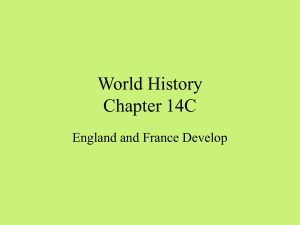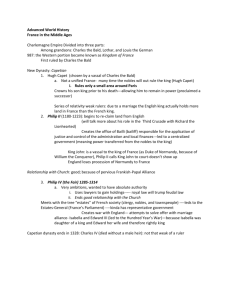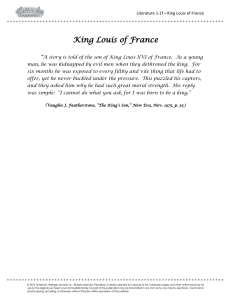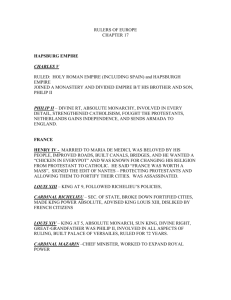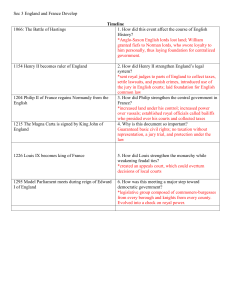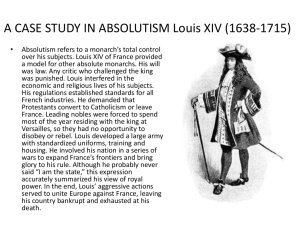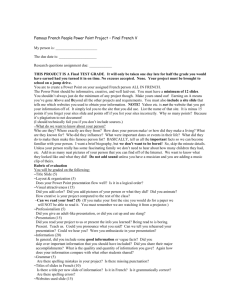Religion
advertisement
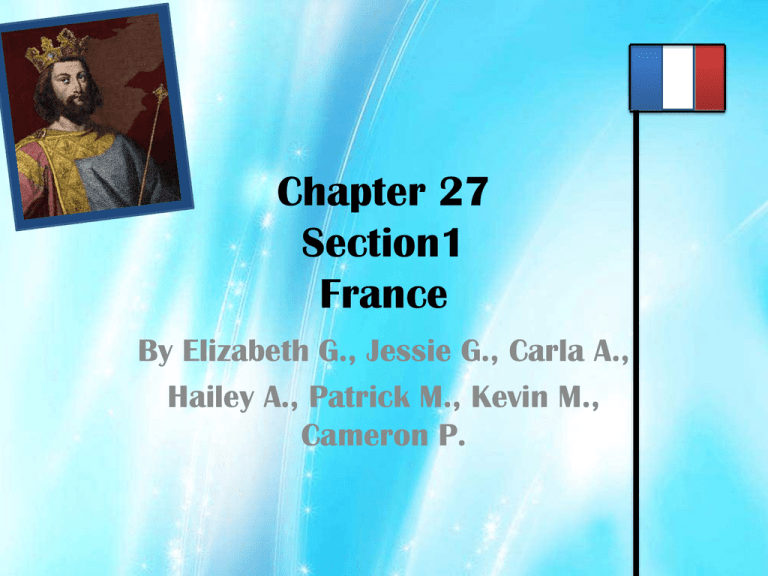
Chapter 27 Section1 France By Elizabeth G., Jessie G., Carla A., Hailey A., Patrick M., Kevin M., Cameron P. Government • • • • • • • Notable Kings: Hugh Capet, Louis VI(Louis the Fat), Philip Augustus, Louis IX, and Philip IV Hugh Capet: Chosen as a French noble, established Capetian monarchy Louis VI: He placed loyal people of lower birth in disloyal’s place, and strengthened monarchy. Philip Augustus: Increased the size of kingdom and made Paris center of government. He fought in the Crusades. Louis IX: He brought peace to France, and united the people. He set up a royal court for disputes in order to stop the nobles who fought. Philip IV: He gained back English invaded territory, and taxed the kingdom. He even taxed the clergy, and set up the Estates-General. Philip gave France a national government. Social Class: – King and Noble – Merchant and Clergyman – Peasant Politics • Philip formed the Estates-General, which was an assembly of nobles, clergy and townspeople. • The Estates-General helped him to run the country and taxed the clergy and made sure that the taxes that were collected were collected regularly. • This marked the beginning of national government in France. • When Philip 4 died, France was untied under one ruler with the Estates-General. Religion • King Louis IX, who was known for his honesty and just dealings, of France was made a saint of the Roman Catholic Church after his death. • French were Roman Catholic Louis expressed his support of the church in this painting that he painted of the king feeding the Pope. Economy and Trade • Most nobles made their own money • Louis IX made it illegal to use coins made anywhere else but the royal mint • Trade led to changes in western Europe • Some changes were political Technology And Warfare • Phillip II won back • Went to war with French land from Flemish because they England didn’t let France control their cloth • Phillip II had royal trade agents to watch nobles to make sure they didn’t gain too much power • Phillip IV seized English fortresses in France Organizer of Hugh Capet’s Monarchy (987-996AD) Although the Capetian dynasty prospered, the rulers following Hugh for the next 100 years were weak and unsuited to rule. Effect: The founding of the Capetian dynasty, lasting more than 300 years after Capet’s death. Hugh Capet, originally a noble, was elected as king of France in 987. Due to feudalism, Capet, as king, only ruled a small part of France from the Seine to Loire Rivers. Hugh Capet Cause: France was in need of a strong, central government. And started with electing a king. Though he only ruled for 9 years, (987996) he was the first in line in the Capetian family rule. Though he was king of France, Capet’s boundaries to rule were very minimal, due to feudalism. Organizer of Louis VI’s Monarchy (1108-1137AD) Effect: It ended up being a win-win situation for Louis VI and the townspeople. As the people developed towns; free of noble control, and Louis VI won over their loyalty and support. Cause: Louis wanted to win over the townspeople's loyalty and support, so he began granting countless charters. Louis VI, also called “Louis the Fat,” was crowned king in 1108. Because one of his major accomplishments was increasing the power of the monarchy, Louis VI had much more of France to rule than Hugh Capet. Some other accomplishments of Louis VI: -Got rid of disloyal nobles -Halted raids of lawless vassals -granted charters to townspeople; freeing them of noble control. Charter- an official document stating permission from a king for people to govern their own affairs. Louis VI Another of Louis VI’s accomplish -ments was replacing disloyal nobles with lower birth men who are loyal. Which is almost identical to Justinian’s legacy of hiring people based on their ability; not social class. Organizer of Philip II’s Monarchy (1179-1223AD) Effect: Philip’s plan worked. While he was away from post, no nobles had overthrew him. Philip II, also called Philip Augustus, was crowned king 1179. Cause: Philip had probably seen from other countries how nobles overthrew kings when they were away. He did not want this happening to him, and had royal agents prevent his nobles from doing so. Two ways Philip added even more land for the French to rule included marrying for land, and winning back French land from the English. Philip II Other accomplishments of Philip II: -appointed Paris as center of government -regulated nobles’ power by having royal agents manage them while he was away on the Crusades Isabella of Hainault- Philip’s first wife whom he married for land. Organizer of Louis IX’s Monarchy (1226-1270AD) Effect: Louis IX stuck to his plan. He did not go to any important wars and lose land, he, with the help of his grandson, did unify France. Cause: Louis, instead of warring with other countries for land, wanted more to unify France as one nation. Louis IX was crowned king in 1226. During Louis’ 44 year reign, he did not gain significant parts of land, as he did not go to war with other countries. Louis IX’s biggest accomplishme nt is finally bring peace to France, and unifying its people. Some of Louis’ accomplishments: -stopped nobles from feuding -illegalized nobles from settling arguments my dueling -forbade nobles from minting their own money -set up a royal court to solve disputes Louis IX The French Royal coin that Louis IX required everyone to use. Organizer of Philip IV’s Monarchy (1285-1314AD) Effect: Taking all these steps eventually formed a strong national government in France, and by 1314, it was united under one ruler. Philip IV, also called “Louis the Fair,” was crowned king in 1285. Philip was a strong believer that the interests of the state came first. Therefore, he destroyed the English fortresses in France, as well as warred with Flanders over trade. Philip IV Cause: Wanted to unify France under one ruler and have a national government. Achieved this by taxing everyone for state use, warring for things he felt necessary to his country, and formed the Estates-General. Other accomplishments of Philip IV: -formed EstatesGeneral -used taxes for state interest use -helped unify France under one ruler Estates-General- an assembly of nobles, clergy, and townspeople. A typical EstatesGeneral meeting
